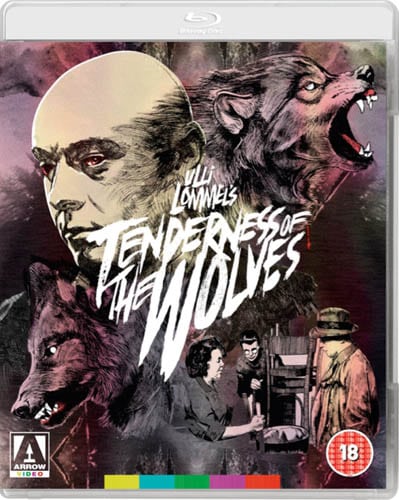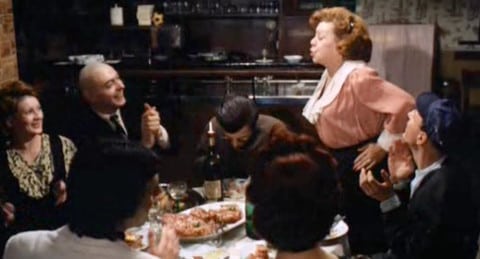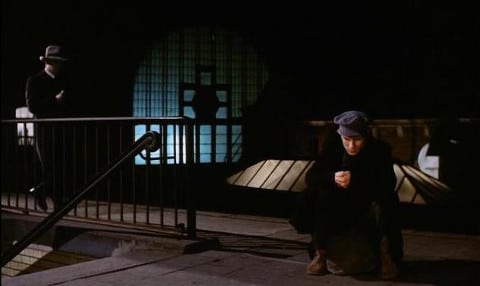Tenderness of the Wolves (1973)
Directed by: Ulli Lommel
Written by: Kurt Raab
Starring: Ingrid Caven, Jeff Roden, Kurt Raab, Margit Carstensen
Germany
AKA DIE ZARTLICHKEIT DER WOLFE
ON BLU-RAY: NOW, from ARROW VIDEO
RUNNING TIME: 81 min
REVIEWED BY: Dr Lenera, Official HCF Critic
In post-World War 2 Germany, Fritz Haarmann is a black marketeer. He and his lover, Hans Grans, spend their days pretending to be charity workers, collecting ‘donations’ from more wealthy areas of the city which they then exchange or sell on the black market. Haarmann is pulled in by the police, who tell him that they’ll turn a blind eye to what he’s doing as long as he’ll inform for them. However, what the cops don’t know is what Haarmann gets up to at night and in the early morning. He’s a killer who seduces young men and even boys and drinks their blood before chopping up their bodies and chucking their bodies in a nearby river, after, of course, he’s removed choice bits and pieces to sell…..
The based-on-true-events Tenderness Of The Wolves wasn’t a film I enjoyed very much, but it was one I admired a fair bit. The kind of film which may make you want to take a shower afterwards, it’s an unashamedly grotty, sleazy – not actually not as graphic as its subject matter may lead you to believe – work which also manages to be extremely well acted and shot, combining the aesthetics of German silent movies [with 1931’s M, where Peter Lorre played one of Haarmann’s contemporaries, Peter Kurten aka the Vampire of Duesseldorf, being a particular influence with star Kurt Raab even looking a bit like Lorre] and the concurrent German social realist movies of director Ulli Lommel’s mentor Rainer Werner Fassbinder [so much so that some have claimed that Fassbinder himself directed this film] into a rather alienating but undoubtedly interesting viewing experience. Fritz Haarmannn aka the Werewolf Of Hanover, was a homosexual child molester with a sideline in vampirism who was convicted in 1924 of two dozen murders, but speculated during his trial that he may have killed 30 people, or perhaps even 40. I don’t know if Lommel’s film is especially close to the facts, and the script does move [for budgetary reasons] the setting of the story from the early 1920’ s to just after World War 2 [though a caption at the end refers to 1925, which makes little sense], but it really feels very authentic. In fact, the new setting actually adds quite a bit, the film conveying very well the sense of a shell shocked country which not only lets a serial killer thrive but whose inhabitants tend not to be too bothered when they do notice what is going on.
Lommel is one odd filmmaker. For some time now his films, often based on real crimes, have had a reputation of being very poor indeed, and he certainly seems to churn them out, though viewings some time ago of the once-Video Nasty The Bogeyman and the sci-fi Brainwaves revealed some talent to me. Fassbinder actually asked him to direct Tenderness Of The Wolves as he felt it was too conscientious to make himself, though he did contribute a memorably sleazy cameo. Lommel, who expressed no interest in the Christian elements in Kurt Raab’s screenplay, made a few alterations to the script, notably making the ‘love’ story between the central character and Hans Grans less dominant, and shooting which he says could be around fifteen minutes of scenes which were not scripted but were inspired by the locations they were filming in. Fassbinder, whom Raab actually based aspects of his character on, had a problem with cinematographer Jurgen Jurges, not just because he stammered but also because he took ages with set ups. This was largely because, in order to get the film to look like a silent movie, he used very old lights which weren’t used any more called ‘inkys’, 150 spotlights which allowed him more flexibility and made it easier for characters to be lit while their surroundings were more in shadow. With such controversial subject matter – though it was the homosexuality more than the killing that made distributors uneasy – Tenderness Of The Wolves was hardly going to attract a mass audience but it did get good reviews and made Lommel’s name, a name which he later seemed to set out to destroy!
Despite what it’s about, Tenderness Of The Wolves has a degree of black humour in it, something evidenced by its opening scene. Haarmann lives in an apartment, and one of the other people living in the same apartment block is being kept awake by his nocturnal meat slicing and dicing and eagerly asks him: “Will I get some tomorrow? Some of your meat”? However, there’s nothing amusing about the very creepy main title sequence where the credits occur over a very lengthy shot of Haarmann’s shadow against a wall as he walks down a street at night, the only music being a short snippet of Bach so for much of the time you just hear his steady footsteps. It’s very frightening, though for much of its time Tenderness Of The Wolves tends to avoid typical horror movie elements, even if you’ll probably feel queasy every time Haarmann approaches a young man or even a child. In fact, for a while it even gets us to feel some sympathy for him, despite him chilling the bones every time he speaks in that emotionless voice of his. Like everyone else in the film, he’s doing what he can to get by, something which usually involves people having to break the law, and he’s also very lonely, homosexuality of course still being a crime. Of course, we already suspect what he does with the boys he brings home, but it’s still a shock when, after we’ve had discreet fade-outs before, the camera eventually remains on him as he breaks a neck and drinks blood in what can’t really help, considering that Haarmann looks a bit like Max Schreck, also be an echo of Nosferatu. Even after this, the film still wickedly plays with our sympathies at times, such as Haarmann being genuinely in love with Grans but Grans not seeming to care about him at all and just selfishly using him.
In the world Haarmann inhabits, the cops seem disinterested that body parts are being found in the local river, hardly anyone notices what he’s up to [it’s patently obvious really] or are incredibly slow on the uptake, and those that do find out usually end up not caring. One woman suspects what’s going on, and even begins to follow him around, but seems to take forever to tell the police, not even doing anything when a murder of a small child could be taking place…well, okay, she tries to warn the boy visiting Haarman not to go up to Haarmanns’s room but makes no attempt to prevent his murder. Another sees what is obviously a corpse lying on Harrmann’s bed but accepts Haarmann’s claim that the person is just asleep. It’s much to the credit of the film, which seems to be attacking the complacency of society with regard to crime and corruption, that it makes all this believable, it all taking place in a setting which seems to be dehumanised. No-one cares about anything or anyone else because they’re too busy trying to survive. The film takes a dim view of virtually everyone in it, from the low lives to the folks trying to maintain law and order. One thing it doesn’t really do is attempt to take us inside the mind of Haarmann, or at least try to give us some understanding of him, why he does what he does. Then again, some things, some states of mind, you can’t really explain anyway.
Tenderness Of The Wolves is, perhaps surprisingly, quite tactful and subtle. We’re not even sure if certain things have actually happened [which, of course, makes matters more disturbing as your mind tries to work things out] and is content to just suggest some details, like the origins of the meat which Haarmann keeps selling. Technically the film tends to be a bit uneven. While much of it was filmed in real locations, no attempt is made to hide the fact that some scenes are shot on sound stages. It’s rather jarring and doesn’t really work for this particular film. The cinematography really is striking though, not necessarily leaping out at you but still noticeable if you’re like me and pay too much attention to these things. Characters are often surrounded by darkness or shot in extremely precise compositions, tending to have things in the middle of the screen separating them. The editing is also interesting in many moments, with people sometimes photographed walking in one direction, then in the next shot being photographed from the opposite side so they are walking past the screen in the opposite direction. While the crew [and indeed the cast] on Tenderness Of The Wolves was largely made up of Fassbinder regulars, the level of cinematic mastery shown by Lummel in this film remains strikingly at odds with what he does now. Watching it, you would think that its director would go on to make many more great movies, but almost the opposite resulted.
So the direction, the acting [Raab is supremely terrifying despite being mostly restrained], the photography etc. is mostly very good throughout, and yet, even though its unsettling nature may remain with me for some time [which is undeniably a high compliment], I was just slightly underwhelmed by Tenderness Of The Wolves, which generally has a very high reputation indeed. Aside from a few lead-ups to murder scenes, the decision to make the subject matter into something closer to a dark comedy of manners rather than a thriller means that, aside from whenever Haarmann is near a minor [which is admittedly a lot], there’s not much in the way of tension, while the whole thing came across as rather distant and cold, with, as I’ve said, little attempt to really get near to its fascinating, though repellent, protagonist. Raab is very convincing in the role, but I feel that, for example, Lorre, in his similar 1931 part, was much more layered. Nonetheless, Tenderness Of The Wolves is a one of a kind experience and deserves to be seen….but you definitively have to be in a certain frame of mind to do so.
Arrow’s Blu-ray, sourced from a transfer prepared in Germany by the Rainer Werner Fassbinder Foundation, is full of depth, is well up to their usual high standards. The film manages to be free of signs of aging yet still look like a movie from 1973. Grain is especially well managed, being evenly distributed and just present enough to give an organic filmic appearance without being distracting. Arrow seems to have produced all the special features, which include a commentary by the director which is different to the one on the old Anchor Bay DVD release, themselves. They’re full of interesting contextual material.
SPECIAL FEATURES
*New high definition digital transfer prepared by the Rainer Werner Fassbinder Foundation
*High Definition (1080p) Blu-ray and Standard Definition DVD presentations
*Original uncompressed PCM mono 1.0 sound • Newly translated optional English subtitles
*Audio commentary by director Ulli Lommel, moderated by Uwe Huber
*Introduction by Lommel
*The Tender Wolf, a newly-filmed interview with Lommel
*Photographing Fritz, a newly-filmed interview with director of photography Jürgen Jürges
*Haarmann’s Victim Talks, a newly-filmed interview with actor Rainer Will
*An appreciation by Stephen Thrower, author of Nightmare USA and Murderous Passions: The Delirious Cinema of Jesús Franco
*Stills gallery
*Theatrical trailer
*Reversible sleeve featuring original and newly commissioned artwork by the Twins of Evil
*Illustrated collector’s booklet featuring new writing on the film by Tony Rayns, editor of the first English-language book on Rainer Werner Fassbinder









Be the first to comment